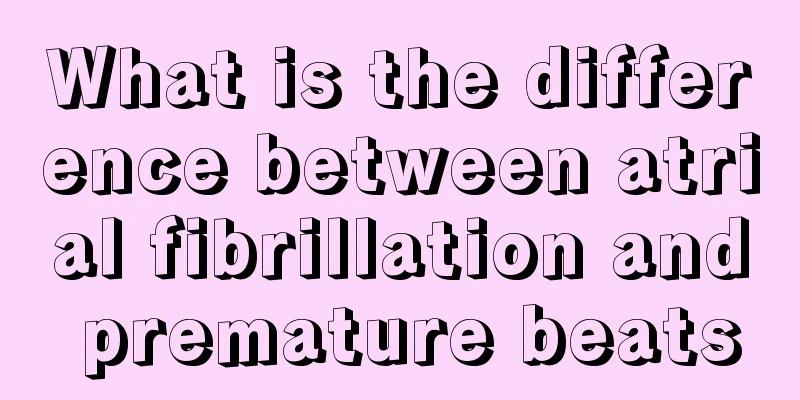What is the difference between atrial fibrillation and premature beats

|
A normal person's heart rate should be maintained at a normal level within one minute to ensure the health of the heart. If a person clearly feels that his heartbeat is abnormal, he should go to the hospital for examination in time. Among them, rapid heartbeat is also called atrial fibrillation and premature beats. Although atrial fibrillation and premature beats both refer to arrhythmia, there are many differences between atrial fibrillation and premature beats that make everyone familiar. Both atrial fibrillation and premature beats are a type of arrhythmia, but premature beats mean that the heart beats prematurely. Sometimes normal people may also experience premature beats, but atrial fibrillation is different. During atrial fibrillation, the heartbeat will be between 300 and 600 beats per minute, and it is completely irregular. People with heart disease, high blood pressure, coronary heart disease and other diseases are more likely to experience atrial fibrillation. Atrial fibrillation, abbreviated as AF, refers to the generation of 350-600 irregular impulses per minute in the atrium. The muscle fibers in various parts of the atrium tremble in an extremely uncoordinated manner, resulting in the loss of effective contraction. The vast majority of cases occur in patients with heart disease such as rheumatic heart disease, coronary heart disease and hypertension. During atrial fibrillation, the ventricular rate is often between 100-160 beats/minute, the rhythm is completely irregular, the heart sounds vary in strength and speed, and the pulse also varies in strength. The pulse number in the same minute is less than the heartbeat number. When the ventricular rate is not too fast, the patient may have no subjective symptoms; when the ventricular rate is too fast, the patient may experience palpitations, dizziness, chest tightness, shortness of breath, etc. Atrial fibrillation reduces cardiac output by 30% and heart failure often occurs. In chronic atrial fibrillation, mural thrombi often form in the atrium, and the detachment of thrombi can cause arterial embolism. Premature beats are abbreviated as premature beats. It refers to the heart beat caused by premature impulses from ectopic pacemakers and is the most common arrhythmia. It may occur in the setting of sinus or ectopic (eg, atrial fibrillation) rhythm. It may occur sporadically or frequently, and may occur irregularly or regularly after every or every few normal beats, forming bigeminy or coupled premature beats. According to the site of origin, it can be divided into four types: sinus, atrial, atrioventricular junction and ventricular. Among them, ventricular premature beats are the most common, followed by atrial premature beats, and nodal premature beats are less common. Premature sinus beats are rare. Premature beats can be seen in normal people or in patients with organic heart disease, and are common in coronary heart disease, rheumatic heart disease, hypertensive heart disease, cardiomyopathy, etc. Premature beats can also be seen in quinidine, procainamide, digitalis or antimony poisoning; hypokalemia; mechanical stimulation of the heart during heart surgery or cardiac catheterization, etc. Premature beats may be asymptomatic or may cause palpitations or a feeling of cardiac arrest. Frequent premature beats can cause symptoms such as fatigue and dizziness (due to reduced cardiac output). For people with existing heart disease, this can induce or aggravate angina pectoris or heart failure. Auscultation may reveal irregular heart rhythm and a long compensatory interval after premature beats. The first heart sound of premature beats is often enhanced, while the second heart sound is often weakened or disappeared. When premature beats are in a binomial or tripeminic rhythm, a long pause can be heard after every two or three heartbeats. Premature beats are inserted between two regular heartbeats and may appear as three consecutive heartbeats. Palpation of the pulse may reveal intermittent absence of pulses. |
<<: Can peony petals be soaked in water to drink?
>>: Tachycardia atrial fibrillation
Recommend
Why is thyroid cancer no longer considered cancer? What is thyroid microcancer?
Some time ago, there were often articles on the I...
What are the treatments for localized endometrial cancer? There are five treatments
The preferred treatment for localized endometrial...
Which should I take first, cod liver oil or milk calcium
There are many aspects that newborns need to pay ...
How to choose medication after nephrectomy
After undergoing surgery, radiotherapy, and chemo...
Is it normal for the fetus's belly to tremble?
Generally, pregnant women will be more nervous in...
Five ways to solve poor sleep quality
What should you do if your sleep quality is poor?...
What is the breast cancer red medicine
What is Mercurochrome for Breast Cancer? 1. Durin...
There are small white worms on the grapes
Many people like to eat grapes because they are n...
How much does it cost to treat bladder cancer?
The cost of bladder cancer treatment varies depen...
Can green tea protect against computer radiation?
In recent years, as the incidence of diseases has...
How to prevent breast cancer? Pay attention to these 4 points to prevent breast cancer
When it comes to breast cancer, all female friend...
Why do I get diarrhea after drinking beer?
Many people drink beer regularly, but they are pr...
What are the early symptoms of skin cancer on the hands
Early symptoms of skin cancer on the hands may in...
What are the benefits of sunbathing in the summer
In summer, because the weather is too hot, people...
What harm do mobile phones do to the body?
Modern people cannot live without mobile phones i...









